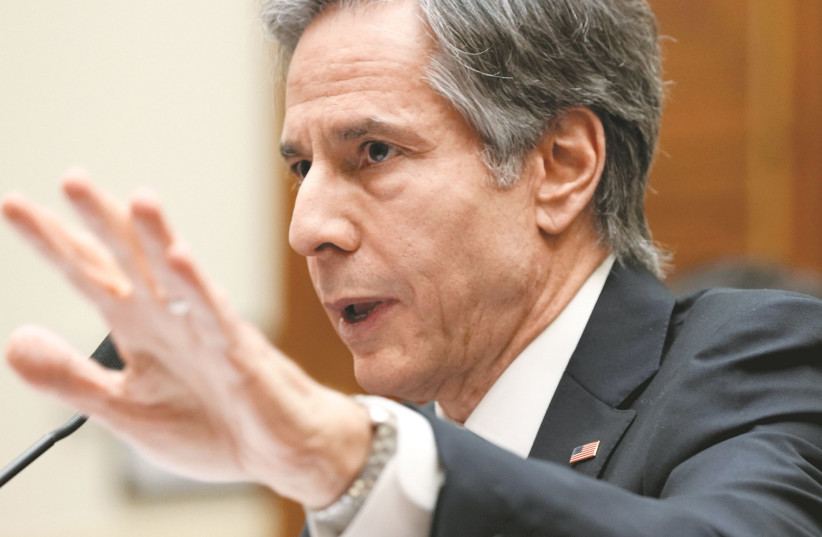Confused messages from the Biden administration about the nuclear deal with Iran days before the start of indirect talks in Vienna between the sides are “very worrying”, Israeli officials said on Sunday. They expressed their concerns after US Special Envoy to Iran, Rob Malley, in an interview with PBS spoke on Friday about a return to the 2015 Joint Global Action Plan without any additional elements that would make it “longer and longer” strong, “as US Secretary of State Antony Blinken said. “The goal is to see if we can agree on what measures the United States needs to take to re-enforce the nuclear agreement and what steps Iran must take to re-enforce the nuclear agreement,” said Malley. On the government’s maximum pressure campaign Trump against Iran, he said the US “will have to lift sanctions that are inconsistent with the agreement that was reached with Iran … so that Iran can enjoy the benefits it should enjoy under the law. “Malley repeatedly spoke of the equivalence between the US and Iran in their behavior, referring to” mutual distrust “between countries.” It is not a question of who has the greatest weight, “he said. “It is if both sides are prepared to carry the burden that they have to return to compliance.” Malley warned against the US or Iran being too firm in their positions. “If one side takes a maximal position and says the other side did everything before moving an inch, I think it’s difficult to see how it works,” he said. Malley acknowledged that Iranian nuclear scientists have more information and experience than in 2015 due to its continued violations of the JCPOA. But he did not suggest any solution, saying only that there will be “difficult discussions about what we need to do in order for us and others … to be satisfied that Iran has returned to its commitments. who took over. “:” If this is American policy, we are concerned. ” The interview “raised eyebrows” at the highest echelons in Israel, the source said, because “in the past, the Biden administration talked about a ‘longer and stronger’ deal – how they were looking for something else – and that is not [in the Malley interview]. It’s all about returning to the 2015 agreement. ”“ Nowhere in the entire interview did Malley say the goal is to prevent Iran from obtaining nuclear weapons, ”said the source. “Nowhere does he accuse Iranians of bad behavior … Nowhere in the interview does he talk about the importance of consultations with American allies in the region.” “In the old agreement, instant sanctions disappear in 2025,” added the source. “In 2030, all nuclear restrictions end. Even Europeans say it is terrible that Iran is developing metallic uranium. This becomes legal in 2030. Is this the agreement they want to get back to? “As for the equivalence that Malley drew between the US and Iran, the officer scoffed:” He is acting as if he were from the UN, saying that both sides are suspicious of each other. ”The official speculated that Americans may see“ a moment of opportunity because there is no government in Israel ”, and they may think that Prime Minister Benjamin Netanyahu will not have a robust response to negotiations with Iran. public speeches in the coming weeks, on Holocaust Memorial Day and Memorial Day for the Fallen of the Israeli Wars, occasions when he mentioned Iran in the past. Linken and Foreign Minister Gabi Ashkenazi spoke on Friday, and the topic of Iran came up, although they did not discuss Malley’s comments. Linken came up with a gradual approach to Iran that would lead to a “sharp” JCPOA, said an official familiar with the call, adding that opinions are divided within the Biden government. Blinken’s Israeli impression is that the Biden government “is not pinning its hopes” on the negotiations in Vienna this week and “is not waiting for a breakthrough”. “They understand that Iran is inclined to refuse any new statements or plans … Iran has a tough stance on returning to JCPOA and removing all sanctions,” said the official. Israeli officials continue to ask Americans to ensure that inspections “anytime, anywhere” by the International Atomic En Agency ergy are included in the deal, which Malley said will be part of the negotiations. In addition, the Israelis emphasize the need to contain aggression from Iran and its representatives in the region. National Security Adviser Meir Ben-Shabbat has not spoken to his American counterpart, Jake Sullivan, since early March, when they held a strategic dialogue on the Iran issue. The senior official said the talks focused on “observing the facts and where we are, not what needs to be done in the future “. Netanyahu has not spoken to anyone in the Biden government since his liaison with US President Joe Biden. in February, said a source in his office.
